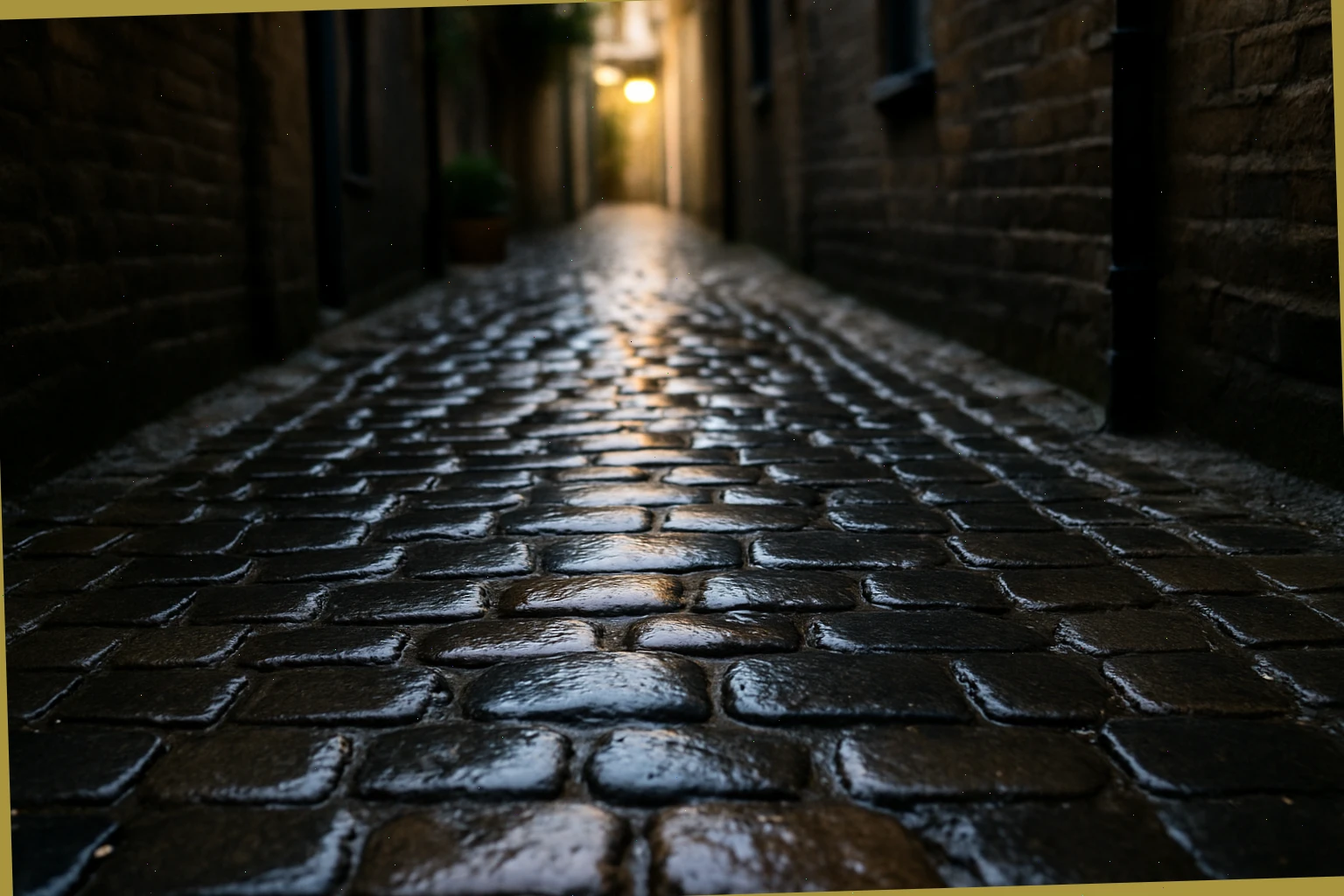Wet Stones, Quick Turns

Some walks begin in sunshine, but this one belonged to the rain. A narrow passage, half-hidden between brick walls, led toward a small yard. Overnight showers had glazed every stone. The surface looked both treacherous and beautiful: treacherous because a misplaced step could slide, beautiful because each slab now carried a private reflection. We called this prompt “Wet Stones, Quick Turns,” and it has since joined our Story Log as one of the simplest yet most fruitful exercises.
The Surface as a Page
Wet stone is never flat. Patches darken unevenly, water pools in the shallow dips, and rain streaks cross at angles. Together these marks resemble handwriting. Many walkers noted that the ground seemed to have already written something before they arrived. All that remained was to read it, misread it, or rewrite it. Nonsense thrives in such misreadings: a puddle becomes an eye, a streak becomes a question mark, a crack becomes a path for ants marching in rhyme.
Slowness and Swiftness
The title insists on contrast: “wet stones” slow you down, while “quick turns” hurry you forward. Balancing the two creates rhythm. Some participants shuffled carefully, exaggerating caution. Others darted between dry patches, making light of the hazard. Each approach carried its own nonsense tone. The cautious ones wrote lines about patience, mud, and heavy boots. The swift ones leaned toward sparks, leaps, and sudden jokes. Together they filled notebooks with fragments that mirrored their pace.
Unexpected Mirrors
Rain left tiny mirrors in each gap. Looking down, walkers saw fractured versions of themselves. One person wrote: “My face is broken into twelve stones, each with a different grin.” Another: “The puddle is my twin, waiting upside down for me to trip.” These reflections, distorted and unstable, proved irresistible as story seeds. A child drew his reflection with added horns and declared it his “puddle monster.” Adults smiled at the invention and copied the phrase for their own verses.
Sounds Underfoot
Wet stone does not sound like dry stone. Each step carries a slight squelch or slap. Writers began transcribing these noises as nonsense syllables: “slop, slip, slup, slap.” The rhythm became a chant, guiding the group forward. A woman added: “Every sound is a drum, every drum is a warning, every warning is late.” The act of listening turned rain into percussion, the path into a stage for improvised nonsense music.
Turning Corners
The passage bent sharply twice before opening into the yard. These quick turns prevented anyone from seeing far ahead. We asked participants to predict what would appear after each bend and to write their guess in a single sentence. Guesses ranged from the plausible (“a red door with peeling paint”) to the absurd (“three geese in boots debating the weather”). After each turn, walkers compared predictions with reality, and the gap between them created laughter. Nonsense was not in being correct but in exaggerating the wrong.
Collective Chorus
At the end, under a lean-to roof, we read fragments aloud. Despite different voices, a pattern emerged. Rain, mirrors, slips, and bends recurred across notebooks. The collective chorus gave the stones a reputation: no longer plain surfaces, but characters capable of tricks. One participant remarked that the stones seemed to write back, answering each notebook line with a new glimmer of water. In that moment the yard became more than setting; it became collaborator.
Practical Notes
To repeat this prompt elsewhere, you need very little:
- A stretch of wet ground, ideally with uneven stones.
- A turn or bend to hide what comes next.
- A notebook to catch reflections, sounds, and guesses.
- A willingness to treat slips as part of the performance, not interruptions.
Safety matters: move carefully, wear shoes with grip, and avoid steep slopes in heavy rain. Nonsense can flourish even at half speed.
Closing Thoughts
“Wet Stones, Quick Turns” teaches that nonsense is not about escaping the ordinary but paying attention to it when conditions change. Rain transforms surfaces, pace alters perception, and reflections invite invention. The stones remain the same, yet under water they become mirrors, drums, or mischievous characters. Quick turns ensure surprise lingers just ahead. Together they form a prompt simple enough for children, flexible enough for adults, and strange enough for anyone who dares to look down and write what they see.
Share Your Fragments
If you try this walk or adapt it to your own street, we welcome your lines. Send them to [email protected], or use the contact form. You can also post paper notes to:
Beacon & Babble
23 Hounds Gate, Nottingham NG1 7AB, England
Phone: 441 115 284 673
Published on: 29 September 2025